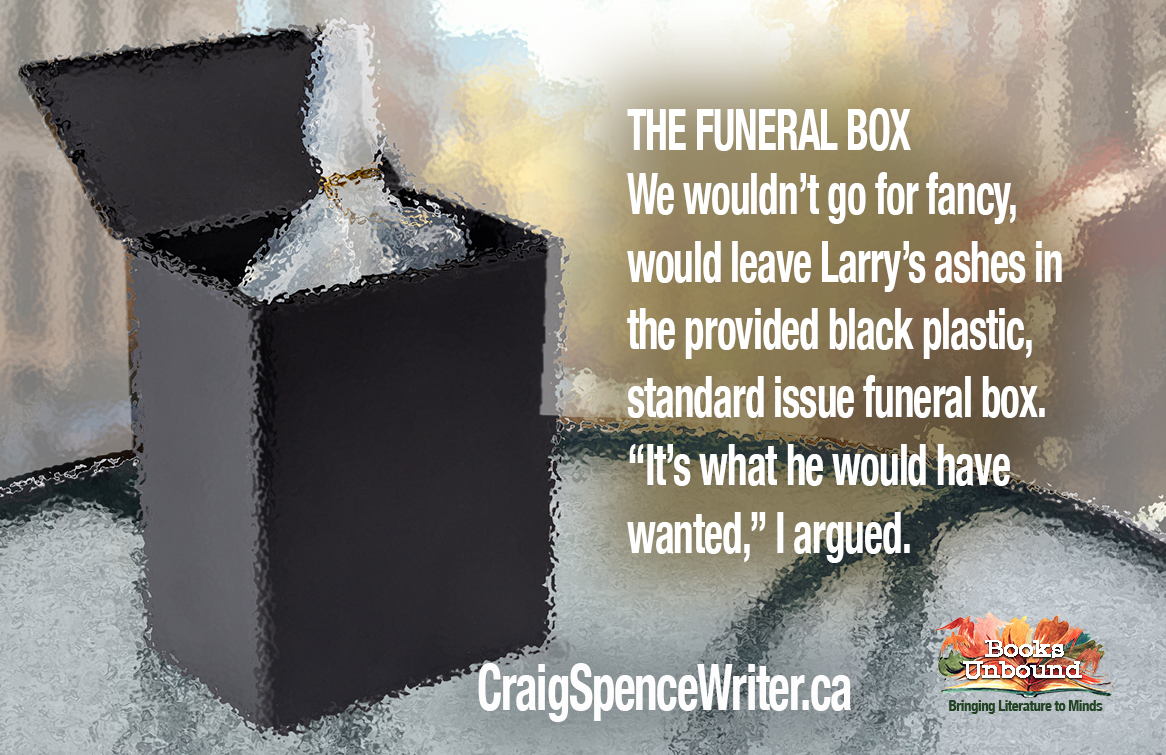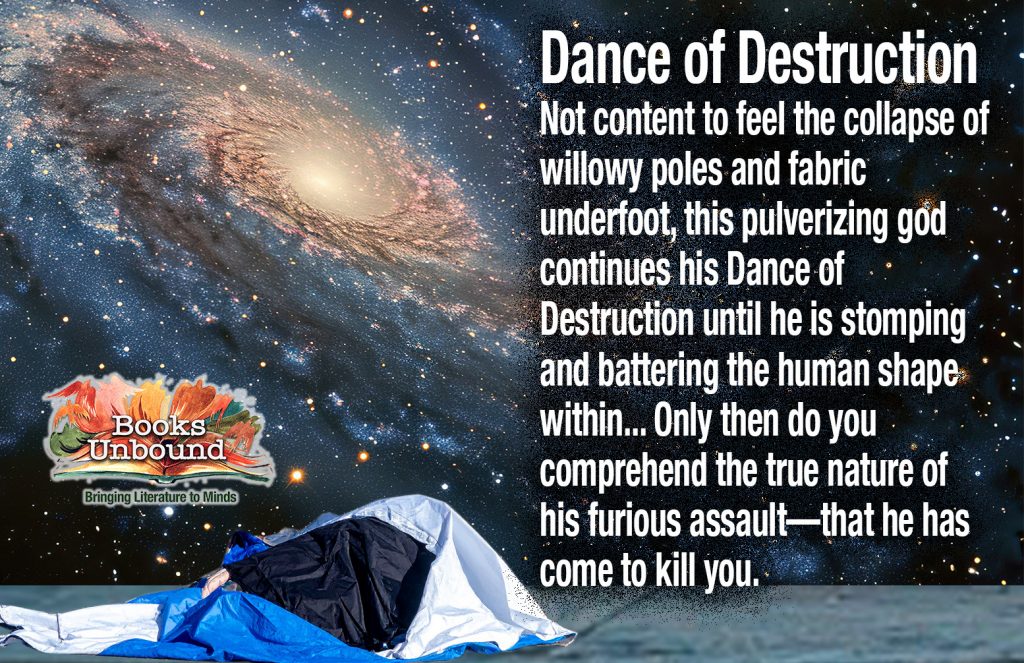
Larry’s sisters Lucinda, Loretta and Louise MacDonald, joined by Lucinda’s new best friend Brenda Tanner, have convened over dinner at an outdoor café in Victoria’s Bastion Square. They’re planning Larry’s Celebration of Life. He had sustained serious injuries after being attacked in the parking lot where he was camped out while working on a mural commissioned ‘retrospectively’ by Brenda. His assailant had defaced the mural, which Larry had just completed and dedicated to Lucinda’s son Manny. But that assault wasn’t the cause of death; Larry died of an overdose in a nearby back alley. A homeless person and recognized graffiti artist, Larry had been living on the streets for about five years, after fleeing the haunted house of his and the MacDonald sisters’ abusive father Carl MacDonald…
***

We wouldn’t go for fancy, would leave Larry’s ashes in the provided black plastic, standard issue funeral box. “It’s what he would have wanted,” I argued. “I don’t want to make his death anything other than what it is by putting his remains into a fancy urn or scattering them to the four winds from some mountaintop you can only get to in a frigging helicopter. He’s dead. The cremated contents in that heavy black container we received are all that’s left of him. The only place Larry lives is in our hearts and minds.”
For a minute we sat in silence, immersed in our private thoughts, oblivious to the soundscape of our outdoor café and Wharf Street.
Brenda and my sisters agreed… eventually.
Cheapskates, Echo chided.
I had taken Larry’s cremation tag to a jeweller who fashioned it into a necklace. My sisters bridled when I showed it to them. “That’s morbid!” Louise made a face. I teased her for looking like an emoji. “Who’s going to wear it?” Loretta wanted to know.
Weird, Echo jumped into the fray.
“It’s symbolic,” I explained. “I want people to ask your question, Loretta; and I want them to cringe like you just did, Louise. Consider it a piece of functional art, a sort of fashion statement…”
I quavered, near tears. They backed off, giving me time and space.
“Who’s going to wear the medallion?” Brenda quietly insisted after a while.
“Good question,” I conceded. “I want everyone to wear it, I suppose.”
Stupid answer, Echo challenged.
I described what I envisioned as Larry’s memorial: a small, round table draped in black; the funeral box on it, elevated by a little pedestal; a commissioned portrait of Larry placed to one side; the cremation-tag necklace on the other; the whole display positioned in front of Larry’s mural—we had already determined that Larry’s life would be celebrated there, and that his temporary shrine would be placed next to his dedication of the wall to Manny.
Brenda had commissioned an artist to restore the mural. She told him to begin with the inscription, and ‘continue with your healing strokes from there.’ She also instructed him to time-lapse the restoration with a camera located on the opposite side of the lot. “We’ll record a piece of art in the remaking to share with the world,” she said. “Love defies entropy,” she proclaimed mysteriously.
Larry would have appreciated the ironic subtext of us using his remains to remind mourning celebrants that, As long as there are eyes to see and minds to remember, this work of art will be envisioned—it will not fade. For him, the fact that eyes develop cataracts and eventually go blind, and memories are ephemeral as plucked harp strings, didn’t constrain or limit consciousness. Larry believed in a universal spirit—chords that resonate and are forever resurrected in the network of awakened, believing souls.
God! And I thought I was the certified philosopher in the family!
I didn’t dare attempt to describe the twisted intellectual rhizomes he’d germinated in the rootball of my infested brain, but I did want to weave what I could make of them subliminally into Larry’s celebration of life, which we were planning. The thought of discussing his memorial indoors stifled me, made me feel like a wrapped mummy in a stone crypt. En plein air, I insisted. Whether out of compassion or enthusiasm, I couldn’t say, but they agreed, and we met at Bastion Square.
It was a bright, sunny evening. We shared an unspoken sense of guilt to be enjoying the breeze, the vibrance of passing traffic, the restaurant chatter and clatter, drinks, good food and—yes—even merriment while we were making arrangements to say our last goodbyes to the canister of ashes that had once been our brother and new-found friend. Larry would have forgiven us. But there was another foreboding source of darkness creeping across the pavement as the westering sun declined and shadows lengthened—Father?
What should we do about Father?
Loretta and Louise didn’t know he had tried to rape me; they only knew we’d had a ‘terrible row’ and that I’d left for good—‘and good riddance’ he’d complained. “If she wasn’t my daughter, I’d report her to the police,” he told them. “She attacked me with a fucking knife!”
I never corrected his version of events. How could I tell my sisters they were living under the same roof as a pervert who had tried to rape one of his own daughters? How could I report him, and have social services step in and shuffle my sisters and brother off into foster care? I did what I had to—warned the old bastard to keep his hands off them, and did my best to keep in touch with my siblings. Brenda was the only one at the table who I’d confided to about my father’s attempted rape; she shot me a warning glance when Loretta asked, “What do we do about Father?”
My whole body cramped. I wanted to shout, How can you even ask that? But managed to keep my mouth clamped shut. Hadn’t they made the connection between Father’s drive-by and the night-time assault on our brother? Wasn’t it obvious that his vicious upbringing had permanently damaged Larry—that he’d verbally battered our brother from the moment Larry had offered the first tentative, shy glimpses of his artist’s soul? Couldn’t they see what a FUCKING HYPOCRISY it would be to invite that piece of shit to my brother’s celebration of life?
“Of course they know all that, hon,” Brenda consoled later. “But they’re prepared to give him the benefit of their doubts; you don’t have any doubts. He destroyed any possibility of doubt that night he tried to rape you.”
In the end, before we left the café, we’d agreed that one of my sisters would invite Father, but that they’d also deliver a letter warning him not to approach me, or my son Manny, or to try communicating with us in any way. I’d walked to Bastion Square, but didn’t feel up to the return trip home and asked Brenda if she’d give me a lift. I felt defeated, knew I’d be increasingly fretful and oppressed at the prospect of meeting the real-life-ogre who had tried to rape me—my father. I wanted Brenda’s companionship. She walked me up to the penthouse instead of dropping me off out front on Oswego Street. I imagined her tucking me in and kissing me goodnight on the forehead before she crept out of my boudoir. Silly me! For the one-and-only first time, she stayed the night.
Talk about The Agonies and the Ecstasies of Lucinda MacDonald’s fucked up life!
